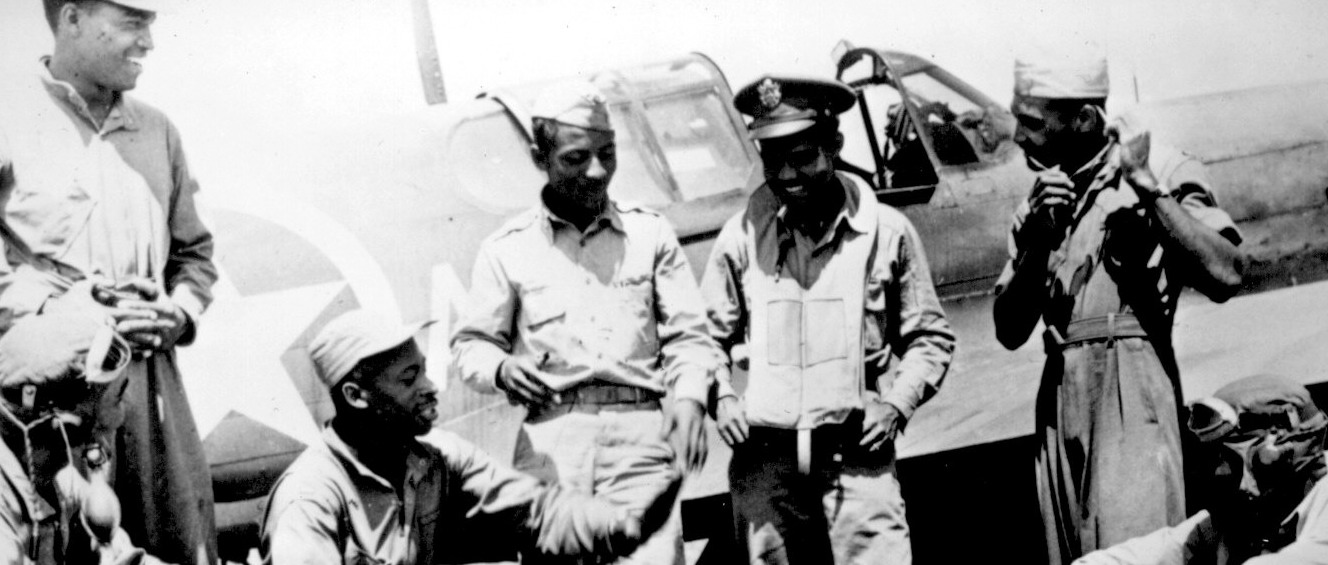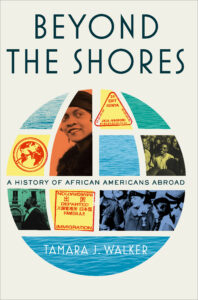
How African American Sacrifice Abroad Was Ignored Back Home
Tamara J. Walker Considers Collective and Personal Histories of Black WWII Vets
My grandpa, John, wore his war story on his face. It was there the whole time I knew him, from my earliest days, but I never really knew how to read it until long after he passed away.
The story’s broad outline lay in the incongruence between the colors of his eyes, one a deep dark brown and the other a grayish blue. He’d lost his second brown eye, and half the sight he was born with, to a piece of shrapnel flying along a Normandy beach on D-Day. He would have faced a lifetime of disfigurement had it not been for the scientific advancements that produced the prosthetic eye he was eventually fitted with, which came complete with a white sclera, a pupil, an iris, and painted-on blood vessels.
Still, the timing could not have been worse: He was one of thousands upon thousands of soldiers who lost their eyes to battle or disease during the war, and the United States struggled to meet their demand. By the time it was John’s turn to get a new eye, his only option was blue.
Little had changed in this world he had sacrificed so much to keep safe.
Maybe white veterans ended up with mismatched eyes, too. But they certainly got the first and best pick of everything else. Back home in Montgomery, Alabama, John stood by as white veterans took plum manufacturing and defense industry jobs that rewarded their tactical expertise, enrolled at the University of Alabama and Auburn to prepare for career changes, got specialized vocational training to start their own businesses, and received loans to buy homes for their growing families during what would come to be known as the baby boom.
Meanwhile, none of those options were available to John or the other African Americans who fought in the war and helped hold down the home front. The latter group had worked (along with white women, Chinese Americans, and Mexican Americans) in factories and defense plants that were desegregated by presidential order so they could help build tanks, planes, and weapons to support overseas troops, only to get laid off at war’s end to make way for white veterans.
Those layoffs saw years of economic gains, professional development, and social progress come to a grinding halt. Training for new career paths was almost entirely out of the question since local universities and trade schools refused to admit African American applicants, which resulted in endless waiting lists at historically Black colleges and universities. Added to that was the double bind created by Federal Housing Administration—endorsed racial covenants that prevented African Americans from buying homes in white neighborhoods, and redlining practices that prevented them from getting mortgages to invest in their own.
Even if John could have managed to sidestep just one of those hurdles, there were others still blocking the way in the form of white staffers at government agencies. The ones at the Veterans Administration found arbitrary reasons to deny African Americans’ access to the GI Bill of Rights, even as they freely signed off on subsidizing white veterans’ educational and wealth-building dreams.
And the ones at the United States Employment Service, which was supposed to help veterans find jobs in the defense industry, instead steered African Americans toward janitorial work, restaurant service, and porter jobs, none of which required the specialized training or expert skills acquired on the battlefield and factory floor. The local banks were in on it, too, refusing to underwrite African American vets’ home or business loans, even with government backing.
John wanted to marry his sweetheart, Willie Mae, and start a family. But what kind of life could they lead in Montgomery? How would he be able to keep a roof over their heads and food on the table, or provide for any children they hoped to have? He found himself thinking back on how skeptical he’d been when he was first drafted, how afraid he’d been to risk his life for a country that would ask so much after giving so little. And he began to wonder if he’d made the right choice.
So little had changed in this world he had sacrificed so much to keep safe. It was 1945 and he still had to sit in the back rows of streetcars and buses. He still had to climb the stairs to the stifling-hot balcony sections of movie theaters. He still had to trudge to the back of gas stations to relieve himself in filthy outhouses, and sneak into dark alleyways when the sign on the only restroom said: “Whites Only.” He still had to endure the rudeness of white cashiers at the stores where he spent his hard-earned money and listen to white men call him “boy.” And he still had to tread lightly in the face of such insults, lest he end up one of the lynching victims he read about in the paper.
He wondered how the United States could bang on about democracy without ever truly practicing it.
Amid this piling on of injustices, the United States was sending billions of dollars in aid to rebuild postwar Europe and promote American-style democracy. John read about it in the Montgomery Advertiser and the Alabama Journal, the same newspapers that showed indifference to Black people’s suffering, even blaming them for their own experiences of racial oppression and violence.
Their front pages trumpeted the benefits of the Marshall Plan (named after its chief architect, former U.S. Army chief of staff turned secretary of state George C. Marshall), insisting it was the only way to halt the spread of Communism from the East. John marveled at the hypocrisy. Like so many African Americans, he wondered how the United States could bang on about democracy without ever truly practicing it. Black newspapers around the state and country, together with the newly founded Ebony magazine, a Chicago-based publication that John would read from its first issues until the day he died, amplified these questions and warned of a foreign policy failure if domestic civil rights issues weren’t resolved.
Their writers knew that the Soviets were using their own propaganda machines to spotlight the United States’ hypocrisy and gain support for the Communist cause, particularly among African Americans. And they knew that even the Western Europeans on the receiving end of U.S. largesse were skeptical of the country’s claims of moral leadership when it treated its own citizens with such cruelty. They heard it with their own ears when they went to places like London, Paris, and Rome.
They also knew that the American money flowing into Europe had a way of silencing open criticism there, no matter how righteous or necessary. But what they did not yet know, could not yet see, was that the United States had the means to extend its power and influence in ways that would make even the farthest reaches of the world feel, to African Americans at least, like they hadn’t left home at all.
____________________________

From Beyond the Shores: A History of African Americans Abroad by Tamara J. Walker. Copyright © 2023. Published by Crown, an imprint of Random House, a division of Penguin Random House LLC. All rights reserved.
Tamara J. Walker
Tamara J. Walker is a historian and associate professor of Africana studies at Barnard College of Columbia University, where her research and teaching focus on the history of slavery and freedom in Latin America. Her first book, Exquisite Slaves: Race, Clothing, and Status in Colonial Lima, won the Harriet Tubman Prize awarded by the Schomburg Center for Research in Black Culture. Her writing has appeared in Columbia Global Reports, The Guardian, Slate, and The Root.



















